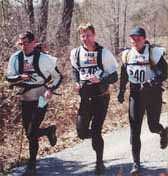


The origins of adventure racing lie in a multi-sport race (mountain running, kayaking, and mountain biking) that takes place in New Zealand, called the Coast to Coast. Founded in 1980, this was the first multi-sport, wilderness endurance race. It was actually created when someone misunderstood a conversation they overheard suggesting some American's were looking to create a wilderness challenge, the next step in our endless pursuit of the ultimate challenge. In an attempt to beat the American's to the punch, Coast to Coast and another race known as the Alpine Ironman were created. Not long after and completely unrelated, the American's actually did dabble in the extreme with a race called the Alaska Mountain Wilderness Classic founded in 1983. While Coast to Coast has grown into one of the most heralded multi-sport races, the Alaska Mountain Wilderness Classic has stayed very grass roots, advertising by word of mouth only, and all profits from the race being given back to the competitors. It is still very much as it was in 1983.
The next big step was the Raid Gauloises (commonly known as the Raid), first held in New Zealand in 1989, the first mixed team multi-sport, multi-day wilderness endurance race. Created by Gerard Fusil, the Raid quickly popularized the sport of adventure racing in Europe (particularly France, Fusil's home turf), Australia and New Zealand through Fusil's superb marketing. To many, this was seen as the ultimate test of human endurance. The Raid traveled to a different exotic location around the world every year leaving room for a new race in the homeland of the sport, Southern Traverse. Founded in 1991, Southern Traverse maintained the true spirit of adventure racing established by the Raid but over a shorter, 3-5 day period (although the winning team has traditionally done it in less than three days). Although the popularity of the sport grew rapidly in Europe, Australia and New Zealand, it was still relatively unheard of in North America. It wasn't until a two-time Raid competitor and talented entrepreneur, Mark Burnett, created Eco-Challenge, that the sport was taken notice of by North America. The first race took place in Utah in 1995 (in the face of much environmental controversy) and grew from there to a status equalled only by the Raid. Since then, many new races have begun to pop up all around the world varying in length and disciplines involved.
In the wake of the heavy media attention around events like the Eco-Challenge, a new, more accessible style of adventure race has emerged - the weekend race. The 5+ day races around the world require not just a huge time commitment for preparation and competing but also a substantial financial investment. The weekend race (typically 36 hours in length) offers a more realistic starting point for those looking to test themselves in the adventure racing arena. They require substantially less time and training to prepare for, technical skill requirements are minimal and the cost is much lower yet they are still long enough and challenging enough to test the limits of most weekend warriors and provide an ideal training ground for those looking to compete in longer races. The result of this new trend - participation in adventure racing is exploding and bringing it perilously close to mainstream.
Seeking the Ultimate Challenge
There are endless accounts through history of the human search for the ultimate challenge. And as each goal is achieved a new, even bigger challenge is set. For some, adventure racing offers the next step in that search for the ultimate challenge. When people felt that the marathon had been tackled triathlons were created. When that got tired, the ultimate triathlon was created - Ironman. Now some people have moved on to double Ironmans and ultra marathons, while others have taken on adventure racing. Although, with adventure racing it was much more than just adding to the distance or physical difficulty. A whole new genre of sport was created by adding much more technical skill requirements, strategy and planning.
Simply stated, adventure racing is an opportunity for people to challenge themselves. It's a chance to push yourself to your limits or, for the really daring, to redefine your limits. This challenge is not just limited to elite athletes either. There is so much more to adventure racing than just being in shape. Anyone wanting to challenge themselves can enjoy adventure racing. In fact, you don't even have to finish a race to reap the rewards - which is good because less than 25% of teams finish their first race. Although the races are designed to be competitive, you quickly learn you are really only in competition with yourself. The point is not how well you did relative to the other teams, it's whether or not you truly challenged yourself.
There are many different reasons why people compete in adventure races but most of them will relate back to the idea of taking on a bigger-than-life challenge and beating it. The sense of reward that comes with it is overwhelming and the bigger the challenge, the bigger the reward.

VI "Parasportas" Ozeskienes 4-2, Kaunas 3000, Lthuania, ph: +370 (698) 36598,+370 (686) 33966, fax:+370 (37) 407991 sportas@rodali.lt